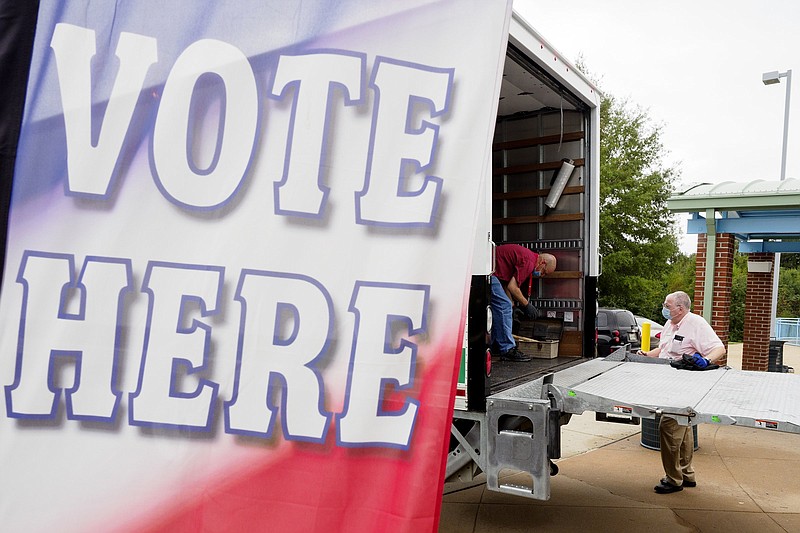After a divisive presidential election in which then-President Donald Trump unsuccessfully raised the specter of widespread voter fraud - rejected by the states, the courts, his own administration and Congress amid an insurrection by Trump supporters - GOP stalwarts in Nashville are pushing forward with crackdowns on what they still perceive as a problem.
Republican state Sen. Janice Bowling of Tullahoma has introduced a bill that would abolish early voting, end the use of voting machines and require watermarked paper ballots hand-marked by voters.
"In-person early voting is a relatively recent phenomenon, and it's led to mischief in many states," she said in an interview.
Two other GOP lawmakers, Sen. Frank Niceley of Strawberry Plains and Rep. Susan Lynn of Mount Juliet, introduced a bill to fingerprint all voters.
These are far from the only voting-related bills before the General Assembly, but they are among the most stringent.
"This is a simplification of the process," Bowling said. "[My constituents are] very concerned that the early vote plus the computer vote has given great opportunities for mischief."
Opponents denounced the bills as voter suppression efforts.
In a statement, Hedy Weinberg, executive director of the American Civil Liberties Union of Tennessee, said Bowling's bill would reduce turnout and make it harder to vote.
"Cutting early voting and eliminating voting machines will only lead to longer lines and fewer voters, hitting Black Tennesseans, working people, senior citizens and people with disabilities the hardest," Weinberg stated.
A record number of Tennesseans voted early, but the state still ranks near the bottom of the country in turnout.
"Sen. Bowling's misguided bill can only be seen as a clear effort to suppress the vote," Weinberg said.
Lisa Quigley, chief of staff to U.S. Rep. Jim Cooper, a Nashville Democrat, sees the bill similarly.
"The TN GOP is always coming up with new ways to suppress voters," Quigley said on Twitter. With a facepalm emoji, she continued: "So predictable. Just as early & absentee voting has become popular, we should, of course, ABOLISH it."
Consequences of disinformation
The pandemic caused many states - led by both Republicans and Democrats - to expand early and mail-in voting in order to limit the spread of the coronavirus. Trump sowed distrust in these voting methods, and many of his supporters chose more traditional ways to vote.
Consequently, Democrats voted early or by mail at much higher rates than Republicans, who more often voted on Election Day.
Along with the increased turnout came victories in the presidential election for Democrat Joe Biden and Democrats in the U.S. Senate. Republicans narrowed the balance of power in the U.S. House of Representatives but didn't win the majority.
A federal commission of cybersecurity experts and election administrators found that "the Nov. 3rd election was the most secure in American history," but Trump continued to claim it was stolen.
That disinformation led to the Jan. 6 violent insurrection on his behalf at the U.S. Capitol last month. Trump was impeached by the House for his role in the riot. In the Senate, 57 of 100 senators found him guilty, but that majority was not enough to meet the two-thirds threshold required to convict Trump.
"Where there is the perception, there is a problem"
Many who accept Trump's view of the election are Bowling's and Lynn's constituents. The lawmakers say they're representing the voices of those constituents. Just the perception of fraud, even if it's demonstrably false, is still an issue, Bowling said.
"I think where there is the perception, there is a problem," Bowling said. Eliminating early voting would "eliminate the perception."
Bowling said her bill would increase turnout by winning back voter trust in the system.
"This is certainly not anything to suppress the vote," she said. "That is the exact opposite of my intent. My intent is to make people confident. ... We want everyone to know their vote does matter."
She said she does not support same-day registration, which is a Democratic priority, but she would entertain making Election Day a holiday.
Similarly, Lynn said fingerprinting isn't a big hurdle, and it would add security.
"Oh golly, there's tons of evidence" of fraud, Lynn said in an interview. "The law is meant to deter, protect, punish. What a great deterrent to fraud."
"Anything that can provide security and confidence for the voters seems like a worthwhile thing to examine," Lynn said.
Other voting bills
There are a handful of bills that would make voting easier, too.
Most of those are sponsored by Democrats from Nashville and Memphis. Few think these bills to expand voting rights have much of a shot in the General Assembly, where both chambers are controlled by Republican supermajorities.
Sen. Jeff Yarbro, D-Nashville, wants to end partisan gerrymandering. He also sponsored a bill requiring the secretary of state to be elected statewide, rather than elected by members of the legislature.
Rep. London Lamar, D-Memphis, sponsored a bill requiring five days of early voting on three big university campuses. Sen. Sara Kyle, another Memphis Democrat, is sponsoring one that would allow college students to prove their eligibility to vote with their student ID.
And Sen. Brenda Gilmore of Nashville is sponsoring a handful of bills that aim to address criminal and racial justice while making more people eligible to vote.
One of Gilmore's bills would create a polling place in Nashville jails; another would remove the requirement that voters be up-to-date on child support payments.
"I don't think you can live through the last four months and not realize that the quality of our democracy is very much under threat," Yarbro said in an interview.
He continued: "Most of us as Americans take democratic institutions for granted. And we don't think of them as policy issues that are going to be debated. But the policy surrounding democracy might be one of the most important issues for the country for the next generation."
